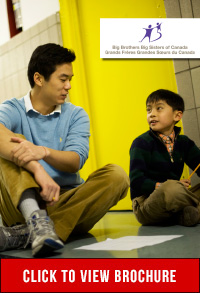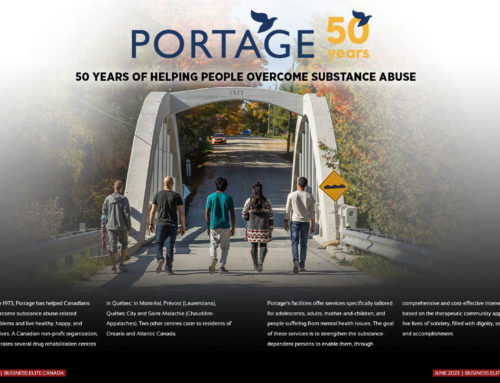Enriching The Lives Of Canada’s Youth
The stories of children whose lives have been transformed by a Big Brother or Big Sister are endless. Peter Coleridge, President & CEO of Big Brothers Big Sisters of Canada (BBBSC), recalls one in particular. A family of four — husband, wife and two young daughters — had successfully immigrated to Canada but after just a short time, the husband passed away as a result of a heart attack. The mother, left alone to raise her children, reached out to Big Brothers Big Sisters for help.
Two volunteer mentors were matched with the girls, spending years providing support and encouragement. One sister went on to complete her post-secondary education at the graduate level, eventually taking on a role in one of the BBBSC member agencies in Alberta. The other sister is a practising pediatrician in Edmonton, Coleridge said.
“That success is incredible. I had the opportunity to meet the mother and talk to her about our programs and she was adamant that, without the support of our organization and the volunteer adult mentors for her daughters, neither young woman would have achieved what they’ve each achieved today.”
There are many stories like these, and each reaffirms the crucial role the non-profit organization has played in shaping Canada’s youth, and the future. It also sums up the reason why Coleridge joined BBBSC just over a year ago, after a diverse career spent working to improve the health and social outcomes of Canadians. “That’s the power of youth mentoring. It comes full circle. It’s transforming young lives and you see the ripple effect into adulthood and then you think about that ripple effect as adults from a health and social outcomes perspective. It’s profound; it’s transformational.”
Serving more than 1,300 communities
At the heart of the organization is the belief that every child should have the opportunity to reach his or her full potential. Across Canada, 108 local member agencies provide services in more than 1,300 communities — a far cry from the launch of the first Big Sisters program and Big Brother agency in Toronto in 1912. That was soon followed by significant growth and in 1972, Big Brothers of Canada separated from the U.S. organization and became self-governing. Three years later, the Big Sisters Association of Ontario was established.
In 2001, Big Brothers and Big Sisters national and provincial organizations merged to become Big Brothers Big Sisters of Canada. The organization across Canada celebrated its 100th anniversary in 2013 and today, more than 40,000 children are matched each year with volunteers through their mentoring programs. One of the biggest advances made throughout the organization’s history was the introduction of national standards based on in-depth research and best practices, Coleridge explained, which has helped focus the work across Canada by emphasizing quality and child safety.
Those standards are also instrumental as the organization looks to the future by developing programs that meet the needs of an increasingly diverse population. Along with the more traditional one-to-one Big Brothers and Big Sisters community-based mentoring programs, one-to-one school-based mentoring programs allow volunteers and students to meet within the school grounds one hour each week. Group mentoring provides a different avenue to help young people attain their goals through mentorship while also benefiting from peer to peer interactions.
DreamCatcher mentoring is an innovative e-mentoring program that uses technology to connect high school students in Canada’s North with mentors working in the students’ careers of choice. By communicating through a secure website, the program is designed to help primarily Indigenous students realize the rewards of staying in school.
“As we move forward, as we look to the future, Big Brothers Big Sisters in Canada really would like to have youth mentoring seen as a need to have and not a nice to have,” Coleridge explained.
Extensive program for volunteers
What helps to make BBBS in Canada successful is its extensive adult volunteer recruitment, screening and training process, which is instrumental in matching the correct mentor and youth. The relationship is well-supervised and volunteers receive ongoing support and coaching as part of the program. The importance of making a firm commitment — one year is requested as a minimum in the one-on-one programs — is emphasized, as is the benefit of being a role model and friend.
There’s no question that BBBS volunteer mentors are making a notable difference in the lives of Canadian children and youth. It’s been proven that children participating in the program are more likely to continue their education and pursue post-secondary studies, find successful employment, engage in less risky behaviours, lead healthier lifestyles and become more involved in their communities, Coleridge said.
“Typically, the youth we serve can be described as vulnerable or at-risk,” he explained. Some may come from a single parent family, and others may live in poverty or experience substance abuse or family violence. Others might experience challenges at school, live in an overcrowded home or be struggling with identity issues. “There are a variety of different challenging situations that underscore the need for a non-familial adult mentor to provide guidance and advice, role modeling, a safe and non-judgemental environment, and greater consistency to help these children and youth build the skills and confidence to achieve more. This looks different for every young Canadian given their situation.”
Youth mentoring is a “need to have”
Future growth for BBBS in Canada means extending the impact of youth mentoring across the country by ensuring governments at all levels, corporate partners, individual donors and the public recognize these cost-effective services have demonstrated health and social outcomes and are a “need to have”. That will mean working with other partner organizations to increase access to youth mentoring programs, and it certainly means recruiting more volunteer mentors and exploring opportunities for increased funding.
“Our biggest challenge as a not-for-profit, just like every other not-for-profit in the country, is resources to do our work. Demand is increasing, and government and other funding is going down. As a result, the fundraising environment is becoming increasingly more competitive,” Coleridge said. “Given the extensive impact of youth mentoring, it needs to be resourced by governments, more corporate sponsors and individual donors in the same manner as our formal health and social services.”
Each year, BBBSC celebrates the efforts of their agencies, staff, volunteers and donors through the National Awards program. The awards recognize the contributions of a vast array of people, companies and the community at both the local and national levels. “We’re just so proud to recognize member agencies and supporters for their work across Canada,” Coleridge said.
Those are the contributions that ultimately impact the tens of thousands of young Canadians who see their lives changed through the support of BBBS in Canada. It can be as simple as lending a sympathetic ear, spending time playing a board game or equipping a young child with the soft skills and confidence to achieve more. It means having a champion and not being judged, and being connected to a world that offers greater opportunity than it did before discovering Big Brothers Big Sisters.







